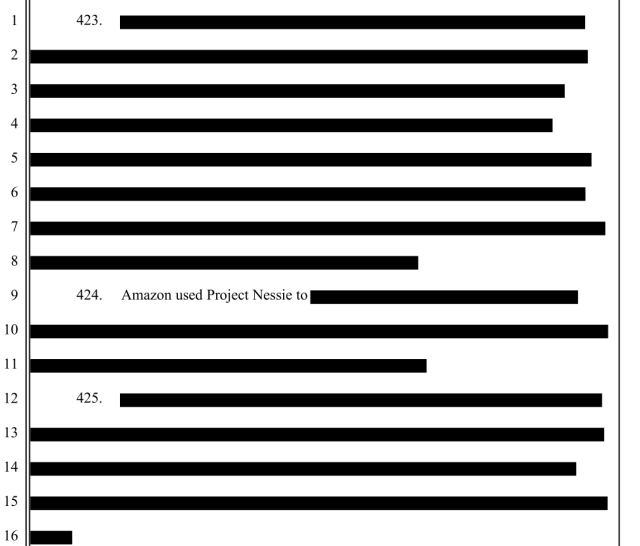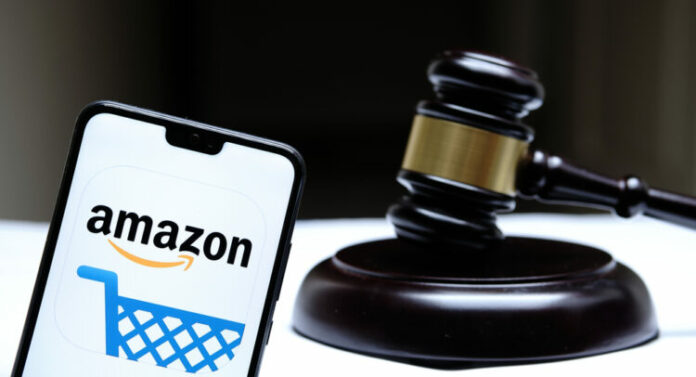The mysterious "Project Nessie," hinted at in what little was not redacted in the FTC's lawsuit against Amazon, is in fact an algorithmic pricing scheme that raised prices where it could safely do so, generating some 1.400 billion dollars for the company during its years of operation. No wonder Amazon wanted to keep it a secret.
The FTC's allegations of anticompetitive behavior cover a number of different practices, including price manipulation. And the example of this practice was Project Nessie.
Unfortunately, when the lawsuit was filed, it had too many arguments, and Nessie was clearly the biggest risk, and for every mention and for every entire page dedicated to her there were entire lines hidden under black bars that prevented its reading. But the process in court is that these arguments must first be respected and then defended, and clearly the public interest argument prevailed over Amazon's preference.

And that is why the not-yet-drafted lawsuit shows many fewer stripes, although the occasional ownership figure is still blocked. But the most important thing is that we have a complete account of Project Nessie:
In addition to these anti-discount tactics, Amazon also goes a step further and increases prices directly and indirectly. Amazon internally created a secret algorithm codenamed "Project Nessie" to identify specific products for which it predicts other online stores will follow Amazon's price increases. When activated, this algorithm increases the prices of those products and, when other stores do the same, it keeps the now higher price driven by them.
Basically, Amazon noted that other stores They tended to follow Amazon's pricing on some products, but not others. Let's say Amazon raised the price of a sheet set from $25 to $30. Perhaps Bed Bath and Beyond would also increase its price, but Wal-Mart held firm at $25. That's not good for Amazon because it meant customers could find that lower price and shop there.
But let's take another situation, where Amazon increases the price of a keyboard from $30 to $40. Maybe the manufacturer of that keyboard sells it somewhere else, and they had matched Amazon's price so as not to lose sales. So now they can safely raise it to $40 as well. Brilliant! amazon gets $10 extra and no one can find a cheaper price anywhere. Of course, the customer loses $10.
By systematically analyzing which products and which competitors resulted in “safe” price increases like this last example, Amazon could arbitrarily raise prices and extract additional profits from customers.
Now Amazon questions this characterization of Nessie. In a comment issued to the Wall Street Journal when the outlet reported some of this information, said the tool was intended to “try to prevent our pricing adjustment from producing unusual results where prices become so low that they are unsustainable. The project ran for a few years on a subset of products, but it didn't work as expected, so we scrapped it several years ago.”
The documents cited by the FTC paint a different picture. The project lasted five years and, whatever Amazon's intentions were, generated around $1.400 billion in additional profits. Amazon is quoted as saying that Project Nessie is “an incredible success,” which somewhat contradicts its most recent statement. And if it were strictly about preventing “unsustainable” low prices, it doesn't make sense that it would only target retailers that match Amazon's profit margins.
That it has been “dumped” is also questionable, as in 2022 Worldwide Amazon Stores CEO Doug Herrington suggested turning to “our old friend Nessie, perhaps with some new guiding logic” to boost retail profits. In fact, Nessie has sunk underwater, but the FTC is clear that she could easily re-emerge if Amazon pleases. However, now that the situation is drawing so much attention, that seems unlikely.
Asked by Amazon about these apparent contradictions, the company declined to comment beyond its original statement. However, they may well have more detailed rebuttals stored in their own court records, although in this Nessie matter, they may well decide that discretion is best with respect to public opinion.




